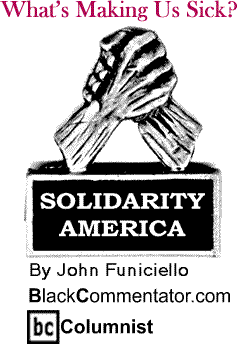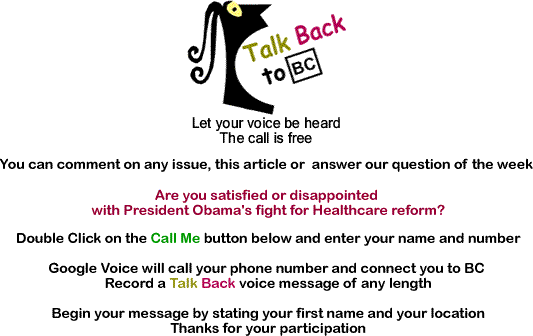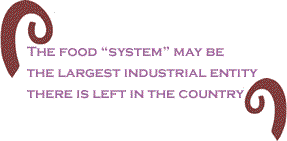
|
||||||||||||||||||||||

|
|
 |
|
For
years - many years - I’ve been reminding people that, when we were
young, trips to the doctor or the hospital were rare. What happened in a short, few generations? We have some of the most frightening diseases and maladies today and they’re not just afflicting the older among us just because we’re living longer. They are striking babies and children. How many children 60 years ago suffered from cancer? How many suffered from autism or Asperger’s Syndrome, or any of the other scores of health problems that have become so commonly reported in the past two decades? It’s true that this is anecdotal, but the more these problems are studied clinically and the more scientific and medical research that is done, the more it seems that we’re making ourselves sick - not that we couldn’t see it coming. Our “health care crisis” that has spawned the chaotic noise over health care reform is something that we could have prevented or, at least, lessened in its effect on us as individuals and human communities. We could have prevented the poisoning of our air and water, with a closer watch over the industries that were strategically placed on our rivers and lakes. These bodies of water became the dumping ground for the toxins of our time. Many communities drew their drinking water from them and, in the process, the health of our bodies was compromised. The same industries spewed poisons into the air and we all breathed it, continuing the breakdown of our systems. These things brought on increasing problems, with asthma and other respiratory illnesses, especially for children whose systems were not mature enough to withstand these assaults on their bodies.
In many cases, this amounted to environmental racism and the people who live there are fighting a never-ending battle to remove the threat to themselves and their children. These problems were in both urban and rural areas. They still are problems in those areas and the fight is the same. In
the past, when There are many to blame. Included of course, would be the industrialists, “robber barons” of the late 19th Century, the modern heads of Corporate America, a legion of national politicians who are largely supported in their repeatedly successful campaigns for re-election by the same corporations, and most of the scientific and medical communities which have failed to warn in the strongest possible terms of the consequences of our way of life, possibly because of the connection between academia and Corporate America. Our “way of life” is something that we, as a people, have done. We have lived without giving much thought to what we have been doing to ourselves, to our continent, and to our earth. We are about 5 percent of the earth’s population, yet we consume some 30 percent of the earth’s resources, give or take 5 percent, according to whose numbers you look at. This has been, and is, unsustainable. For the past 40 years, since that first Earth Day, a large percentage of Americans have had a pretty good idea what was happening and a pretty large number of those people were in a position to do something about it. There were too many - the children, the poor, and disabled - who were not in a position to solve any of those monumental problems. They had to take life as it came, something to which they’ve become accustomed, even though it makes them sick. However you look at it, Americans live an affluent life, with a concentration of consumption of all manner of goods right at the top of the income scale. Our “carbon footprint” is very large and it’s going to take a great effort to make it smaller.
In
the 1980s, during a strike of chemical plant workers in He
pointed out that many chemical plants in the It
was clear to them that, when the unions inside the plants were strong
and could make the plants safe and healthy for the workers, the
communities in which the plants were located also were healthier
and safer. As unions have been diminished in the One
of the primary causes of our general debilitated condition is the
Neither of these claims is connected to the reality of our daily lives. The outcomes to our health care system show it. We’re far down on the list of developed nations in infant mortality and our life expectancy is not as long as many other nations, for two quick examples. Every day, we hear of some other health problem that is not treatable with what American medicine has to offer. We’ve
begun to learn about the rise of swine flu and that it likely comes
from the industrial production of pork, in which system the pigs
and the farm workers suffer greatly. We’ve had pfiesteria in the
Chesapeake Bay, in which the poisoned water is related to the disposal
of the feces of the 600 million chickens that are produced on How does a nation ring the alarm bells about the “obesity epidemic” and the explosion of Type II diabetes, even among the children, without acknowledging that it is our “systems” that are sickening us?
Since
World War II, the way of producing food in the In recent years, researchers and even movie makers have focused on the food system and Americans have begun to learn something about what’s making them sick. It does appear to be the “systems.” Whether consumer goods or our food are produced domestically or in foreign countries, they come from “systems” that were designed for two things - maximized profits and consolidation of control of those systems by corporations. All of this is made possible by our technological prowess. Without computers and other technical wonders, this kind of control and profit-taking could not be done. The central control present in all of our systems is by corporations, which tell us what we’re going to buy. We have “choices,” but every one of those choices is given to us by Corporate America and, when you think about it, there aren’t many.
Slowly, very slowly, the people are becoming aware of the insidious nature of the “choices” that we’re allowed to make. Like it or not, you will eat large quantities of high fructose corn syrup and hydrogenated fats, which are added to most prepared food because they are cheap. Americans eat a lot of prepared food. The industrial model of production of our food gives us limited choices, even if there are 45,000 items for sale in our supermarkets, because our food dollars are spent on a minuscule percentage of those supermarket items. Unbalanced systems - in terms of power of the people, compared with the small percentage of corporations and individuals that control our “choices” - can and do make us sick. If we want to address our “health care crisis,” we must first address the industrial systems that make us a relatively insignificant part of the process. BlackCommentator.com Columnist, John Funiciello, is a labor organizer
and former union organizer. His union work started when he became
a local president of The Newspaper Guild in the early 1970s. He
was a reporter for 14 years for newspapers in
|
|
 |
|
Any BlackCommentator.com article may be re-printed so long as it is re-printed in its entirety and full credit given to the author and www.BlackCommentator.com. If the re-print is on the Internet we additionally request a link back to the original piece on our Website. Your comments are always welcome. eMail re-print notice
If you send us an eMail message we may publish all or part of it, unless you tell us it is not for publication. You may also request that we withhold your name. Thank you very much for your readership. |
|
| |
|
| September17
, 2009 Issue 342 |
|
| Executive Editor: Bill Fletcher, Jr. |
| Managing Editor: Nancy Littlefield |
| Publisher: Peter Gamble |
| Est. April 5, 2002 |
Printer Friendly Version
in resizeable plain
text format or pdf
format. |
 |

|
| |
| |






























 Many
of these things have become “issues” for Americans, especially since
the first Earth Day, April 22, 1970. We have come a long way as
a nation to clean up some of the most toxic waters and pockets of
toxic air, but still the air and water are not safe for multitudes
of our people. Such things as dumps, hazardous waste landfills,
and burn plants that spewed the toxins into the air and ground water
were placed in areas where poor people lived - where they still
live.
Many
of these things have become “issues” for Americans, especially since
the first Earth Day, April 22, 1970. We have come a long way as
a nation to clean up some of the most toxic waters and pockets of
toxic air, but still the air and water are not safe for multitudes
of our people. Such things as dumps, hazardous waste landfills,
and burn plants that spewed the toxins into the air and ground water
were placed in areas where poor people lived - where they still
live.
 We
Americans can’t seem to reconcile the reconstruction of a safe environment
with our seeming need to buy stuff and all of the negatives that
go along with that stuff’s manufacture, transportation, distribution,
retail sale, and disposal.
We
Americans can’t seem to reconcile the reconstruction of a safe environment
with our seeming need to buy stuff and all of the negatives that
go along with that stuff’s manufacture, transportation, distribution,
retail sale, and disposal. For
more than a century, American industry “externalized” its costs
- that is, companies left their pollution and other problems to
subsequent generations, to both deal with on a medical level, to
clean up, and to pay for, often long after the company had moved
to another country or shut down to move to the next fast-money operation.
For
more than a century, American industry “externalized” its costs
- that is, companies left their pollution and other problems to
subsequent generations, to both deal with on a medical level, to
clean up, and to pay for, often long after the company had moved
to another country or shut down to move to the next fast-money operation.










